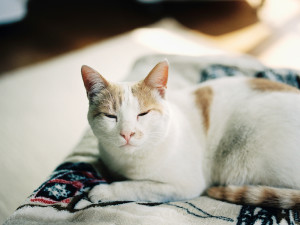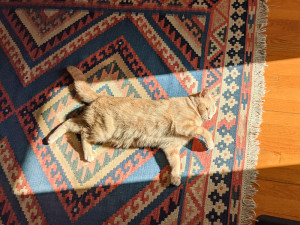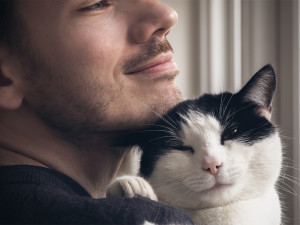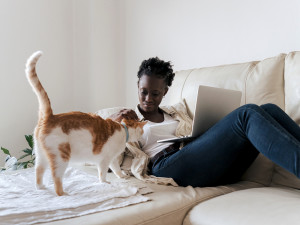Being a Neurotic Pet Parent is a Good Thing, Study Says
“Cat ladies aren’t crazy, they’re just anxious...and that anxiousness is associated with trust and affection for a cat.”
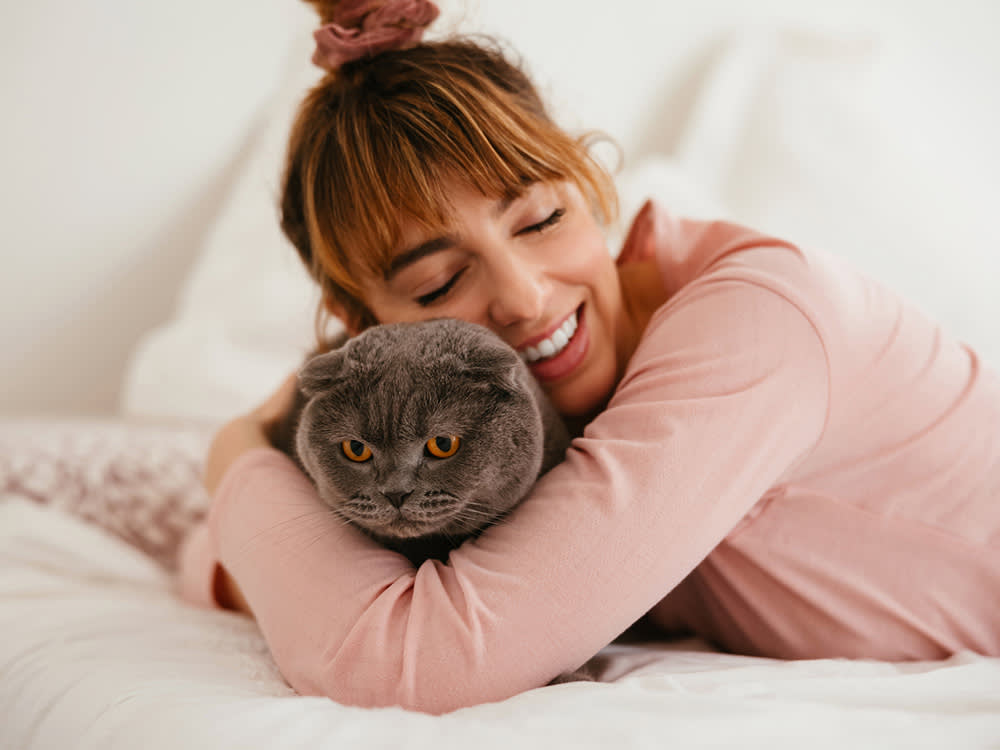
share article
“Cat ladies aren’t crazy, they’re just anxious,” says Dr. Mikel Delgado, a postdoctoral researcher at the UC Davis School of Veterinary Medicine and co-author of a study that says cats can actually benefit from anxious pet parents. “Our study finds that anxiousness may be a positive trait to have because it is associated with trust and affection for a cat.” Go figure!
In an earlier study, in 2010, University of Texas psychologist Dr. Sam Gosling found that dog parents tend to be more extroverted, but less open to new experiences, while cat parents are more likely to be more neurotic, but also more creative and adventurous.
Inspired by those results, Dr. Delgado’s team conducted a studyopens in a new tab in 2015 to examine how personality traits related to the attachment people had towards their pets. Both dog parents and cat parents participated in the research. Results of the study showed that nearly 40% of respondents said they liked dogs and cats equally, while 38% identified as dog people and 19% as cat people. The questionnaire measured participants’ affection for their pets and their overarching “Big 5” personality traits (openness, conscientiousness, extraversion, agreeableness, and neuroticism).
Researchers also asked questions to gauge the participants’ attachment style — an assessment of how people form relationships. People who score high on anxious attachment tend to need more reassurance from the objects of their affection. Conversely, people who rate highly on avoidant attachment — those with a less affectionate and more withdrawn temperament — are much less needy. The study found those with anxious attachment tended to be younger people who chose a cat as a favorite pet, though both dog and cat people scored low on avoidant attachment.
Results showed that self-described “neurotic” and “conscientious” people expressed the greatest affection for their pets, suggesting that qualities often attributed to overbearing parents of children might work better for cats and dogs, who require lifelong parentingopens in a new tab.
“The fact that higher levels of neuroticism are associated with affection and anxious attachment suggests that people who score higher on that dimension may have high levels of affection and dependence on their pets, which may be a good thing for pets,” says Dr. Delgado. Those results lead researchers to their next study. How do individual neuroticism factors like anger, anxiety, depression, immoderation, self-consciousness and vulnerability relate to attachment with cats?
In the 2020 studyopens in a new tab, Dr. Delgado and co-author Dr. Gretchen Reevy, a psychologist with California State University, East Bay, conducted an online, anonymous survey of 1,239 cat parents (87% of which were female). The survey asked questions about how worthy people felt of their cat’s love, how available and trustworthy they felt their cat was, and their general feelings of affectionopens in a new tab toward their cat.
While higher scores on neuroticism and anxiety could benefit a relationship with one’s cat, the study shows that higher scores on most negative emotions, especially depression, were related to feeling less worthy of their cat’s love. Previous studies have found similar results in romantic relationships and friendships.
“If you are prone to depression, you’re seeing everything through that lens,” Dr. Delgado says. “This shows that a tendency toward negative emotions will affect any relationship, including a relationship with a cat.”
In contrast, the way in which negative emotions influenced feelings of trust in a relationship depended on whether the relationship was with a human or cat. In relationships with humans, depression decreased the feeling that a friend or partner was trustworthy. With cats it was different — anger decreased the feeling that a cat was trustworthy, while anxiety increased the feelings of trust.
Dr. Delgado says she embarked on the study to understand what can help people have a better bond with their pet. A lot of that can be influenced by human behavior. For some, “cats may be our sole companions. They’re important to our lives,” she says. “But problems with the human-cat relationship put cats at risk for ending up in animal sheltersopens in a new tab.”
“Cats can be wonderful companions and sources of comfort,” says Dr. Reevy. “And it looks like a person’s personality affects their tendency to appreciate, enjoy, and hopefully benefit emotionally from a relationship with a cat.”
Amy Quinton
Amy Quinton is a veterinary sciences writer at UC Davis. Republished with permission under the CC BY 4.0 licenseopens in a new tab, courtesy futurity.org.
Related articles
![White and light brown cat laying down with eyes almost closed]() opens in a new tab
opens in a new tabStudy Says “Slow Blinking” at Your Cat Helps You Bond
A team of psychologists at the Universities of Sussex and Portsmouth have discovered the key to building a bond with cats.
![The author's orange tabby cat, Jeff, basking in the sunlight on a living room floor]() opens in a new tab
opens in a new tabHow Covid Changed My Relationship with My Cat
The pandemic turned me into a morning person and my cat into a mama’s boy.
![cat snuggling man]() opens in a new tab
opens in a new tabWhat’s Your Cat’s Love Language?
Five surprising ways cats show affection (and how you can show it back), according to a cat behaviorist.
![Black woman sitting on her couch with laptop and petting her cat]() opens in a new tab
opens in a new tabYour Cat Can Read the Room Better Than You Think
A new study finally confirms what pet parents already know: cats are great communicators.
